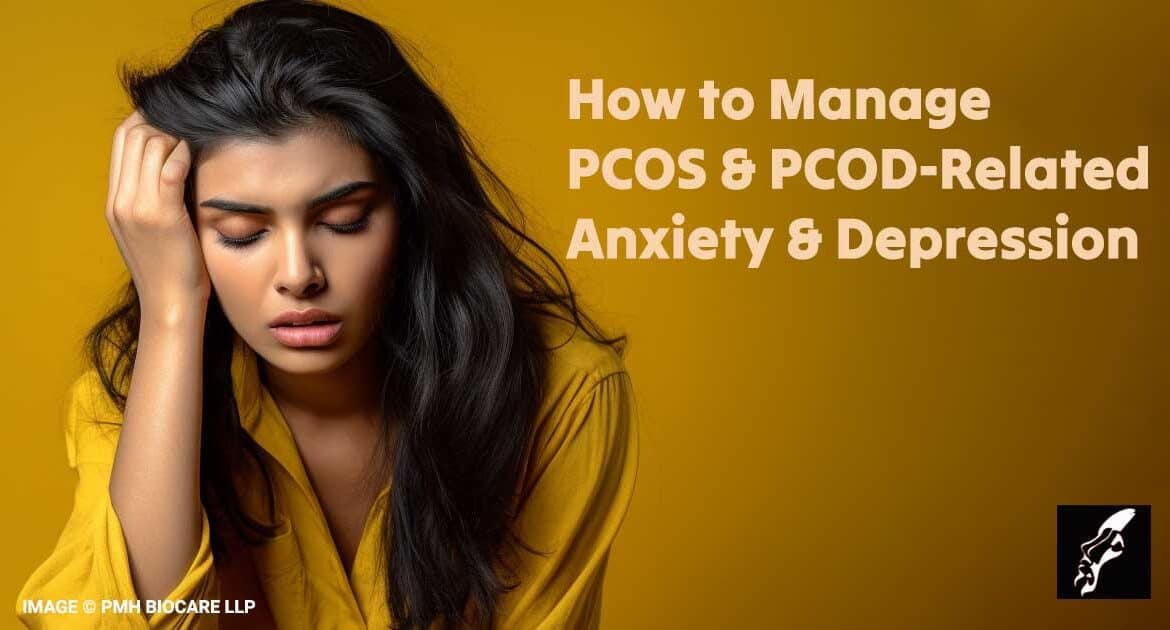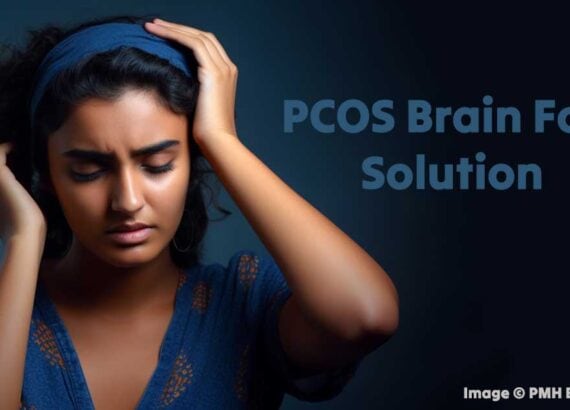How to Manage PCOS & PCOD-Related Anxiety and Depression

PCOS (Polycystic Ovary Syndrome) and PCOD (Polycystic Ovary Disease) are common hormonal disorders that affect women of reproductive age. While the physical symptoms of these conditions are widely known, many people are unaware of the impact they can have on a person’s mental health.
Women with PCOS and PCOD are at higher risk of developing anxiety and depression than those without these conditions. The hormonal imbalances and physical symptoms associated with PCOS and PCOD can trigger negative emotions and impact a woman’s quality of life. In this blog post, we’ll discuss effective ways to manage anxiety and depression related to PCOS and PCOD.
Create a life that feels good on the inside, not one that just looks good on the outside.
Seek Professional Help
If you’re experiencing symptoms of anxiety or depression, seeking professional help is crucial. A mental health professional can provide you with the necessary tools and resources to manage your emotions effectively. They may recommend therapy or medication to help alleviate your symptoms. Remember, there’s no shame in seeking help when you need it.
Practice Mindfulness
Mindfulness meditation is an effective way to manage anxiety and depression related to PCOS and PCOD. It involves paying attention to the present moment and accepting it without judgment. Practicing mindfulness regularly can help reduce stress and improve overall well-being. You can start by finding a quiet place to sit, closing your eyes, and focusing on your breath. Whenever your mind starts to wander, gently bring it back to your breath.
Exercise Regularly
Regular exercise is beneficial for both physical and mental health. It helps regulate hormones, reduce stress, and boost mood. Even light exercise, such as walking or yoga, can be helpful in managing anxiety and depression related to PCOS and PCOD. Find an activity that you enjoy, and make it a regular part of your routine. You don’t have to go to the gym to get moving; even dancing in your living room counts!
Eat a Balanced Diet
A healthy diet is essential for managing PCOS and PCOD. It can also help alleviate symptoms of anxiety and depression. Eating a balanced diet that is rich in whole foods, such as fruits, vegetables, whole grains, and lean proteins, can help regulate hormones and improve overall well-being. Avoid processed foods, sugary drinks, and alcohol, as they can exacerbate symptoms.
Get Enough Sleep
Sleep is crucial for overall health and well-being. Lack of sleep can lead to increased stress and anxiety. Aim for at least 7-8 hours of sleep per night to help regulate hormones and improve mood. Establish a bedtime routine, such as taking a warm bath or reading a book, to help you wind down before bed.
Practice Self-Care
Practicing self-care is crucial when dealing with PCOS and PCOD-related anxiety and depression. Taking the time to pause, breathe, and do something that makes you feel good can help reduce stress and improve your mental health. Whether it’s taking a bubble bath, reading a book, or going for a walk, make sure to prioritize self-care in your routine. Remember, you can’t pour from an empty cup.
Set Achievable Goals
Dealing with PCOS and PCOD-related anxiety and depression can be a constant battle. Instead of focusing on the negatives, use this as an opportunity for self-improvement. Set small achievable goals for yourself, whether it’s drinking more water, eating healthier, or getting enough sleep. Celebrate your wins, no matter how small they may seem. Remember, the best project you will ever work on is yourself.
Focus on Inner Happiness
It’s easy to get caught up in the external pressures of society, especially when dealing with PCOS and PCOD-related anxiety and depression. However, take the time to reflect on what truly makes you happy on the inside. Focus on building a life that aligns with your values and brings you joy, rather than one that just looks good on the outside. Remember, true happiness comes from within.
Conclusion
Managing anxiety and depression related to PCOS and PCOD can be challenging, but it’s important to remember that you’re not alone. Seek professional help if you’re experiencing symptoms that are interfering with your daily life. Practice mindfulness, exercise regularly, eat a balanced diet, and get enough sleep to improve your overall well-being.
Remember, taking care of your mental health is just as important as taking care of your physical health. With the right treatment and lifestyle changes, you can manage your symptoms and live a happy and fulfilling life.
If you have any concerns or questions about PCOS or PCOD, it’s always best to consult with a healthcare provider. They can help you develop a personalized treatment plan that meets your specific needs.
Living with PCOS and PCOD can be challenging, but it’s important to stay positive and focus on the things you can control. With the right mindset and support, you can overcome any obstacles and live a happy and healthy life.
FAQs
Q: Can PCOS and PCOD cause anxiety and depression?
A: Yes, women with PCOS and PCOD are at higher risk of developing anxiety and depression than those without these conditions.
Q: What is mindfulness meditation?
A: Mindfulness meditation involves paying attention to the present moment and accepting it without judgment.
Q: Can exercise help with PCOS and PCOD-related anxiety and depression?
A: Yes, regular exercise can help regulate hormones, reduce stress, and boost mood.

Digital creator
🇮🇳 India’s first AI generated brand ambassador
♀️PCOS & Depression warrior
🍽️ Foodie yet Health-conscious 🥗
🌍 Travel Enthusiast ✈️ Fashion Lover 👗





